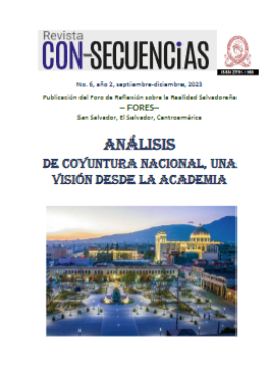RELEVANCIA DE LA POSICIÓN ESTRATÉGICA DE EL SALVADOR EN LA GEOPOLÍTICA ACTUAL LATINOAMERICANA
Palabras clave:
El Salvador, Geopolítica, Geoestrategia, NegociosResumen
El Salvador es un país geográficamente pequeño, pero de gran interés geopolítico tanto para Centroamérica como para el conjunto de América Latina. Su relevancia viene, principalmente, de su ubicación geoestratégica en medio del continente americano. Los acontecimientos históricos no han sido muy favorables durante el siglo XX: ha sufrido masacres, Guerra entre países, Guerra civil, así como un crecimiento, expansión y prácticamente el dominio de muchos territorios por parte de las pandillas (maras). Por otra parte, las oportunidades de negocios que se han abierto en un mundo globalizado son grandes y El Salvador, como país y como gobierno está sabiendo responder a esas nuevas circunstancias del escenario regional y mundial, pero también los inversionistas y empresarios pueden aprovechar las ventajas competitivas que ofrece El Salvador.
Descargas
Referencias
Black, J. (2015). Geopolitics and the Quest for Dominance. Indiana University Press.
Brzezinski, Z. (1997). The grand chessboard: American primacy and its geostrategic imperatives.
Brzezinski, Z. (2009). The choice: Global domination or global leadership. Basic Books.
Cohen, S. B. (2014). Geopolitics: the geography of international relations. Rowman & Littlefield.
Dalby, S., Routledge, P., & Tuathail, G. Ó. (1998). The geopolitics reader. Routledge.
Dalby, S. (2014). Critical Geopolitics and the Control of Arms in the 21st Century. In Reconceptualising Arms Control (pp. 48-64). Routledge.
Edward N. Luttwak (1990), “From Geopolitics to Geo-Economics: Logic of Conflict, Grammar of Commerce”, en The national Interest, pp. 17-23.
Geopolitics: The politics of writing global space (Vol. 6).
Grygiel, J. J. (2006). Great powers and geopolitical change. JHU Press.
Kaplan, R. D. (2009). The revenge of geography. Foreign Policy, 172.
Kelly, P. (2016). Classical geopolitics: a new analytical Model. Stanford University Press.
Kissinger, H. (1994). Diplomacy. Simon and Schuster.
Kissinger, H. (2015). World order. Penguin Books.
Leonard, M. (2016). Connectivity wars. Why migration, finance and trade are the geo-economic battlegrounds of the future
Luttwak, E. N. (1990). From geopolitics to geo-economics: Logic of conflict, grammar of commerce. The National Interest, (20), 17-23.
Mackinder, H. J. (1904). The geographical pivot of history.
Mackinder, H. J. (1942). Democratic ideals and reality a study in the politics of reconstruction.
Mackinder, H. J. (1942). The round world and the winning of the peace.
Mahan, A. T. (1890). The influence of sea power upon history, 1660-1783.
Morgenthau, H. J. (1948). Politics Among Nations: The Struggle For Power and Peace. New York: Alfred A. Knopf Inc.
Spykman, N. J. (1938). Geography and foreign policy, I. American political science review, 32(1), 28-50.
Spykman, N. J., & Rollins, A. A. (1939). Geographic objectives in foreign policy, I. American Political Science Review, 33(3), 391-410.
Spykman, N. J., & Nicholl, H. R. (1944). Geography of the Peace.
Tuathail, G. Ó. (1996). Critical Kennedy, P. (1987). The rise and fall of the great powers.
Publicado
Número
Sección
Licencia

Esta obra está bajo una licencia internacional Creative Commons Atribución-NoComercial 4.0.





